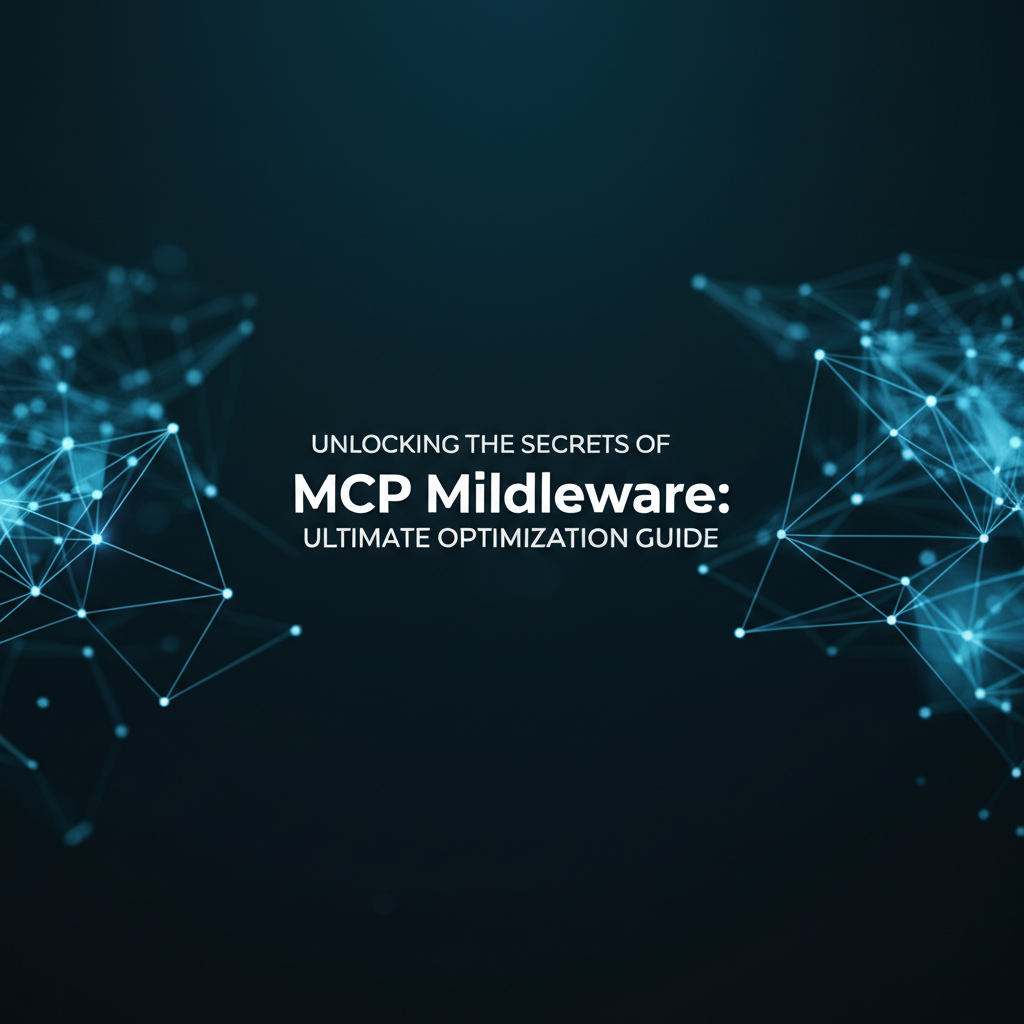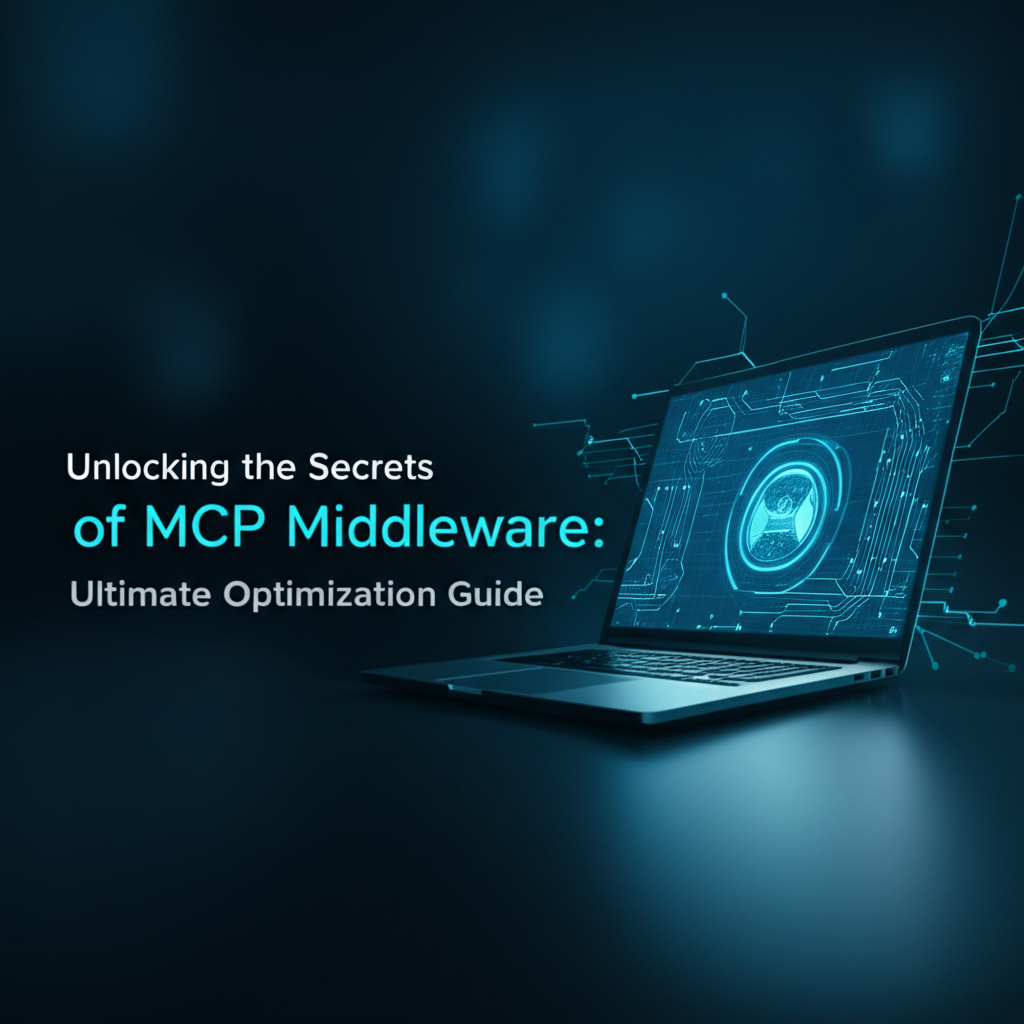Unlocking the Secrets of MCP Middleware: Ultimate Optimization Guide

Build AI Agents With Incredible MCP
Introduction
In the rapidly evolving landscape of artificial intelligence, the Model Context Protocol (MCP) has emerged as a crucial technology for enabling seamless communication between AI models and the vast array of data sources and tools available today. MCP Middleware serves as the bridge that connects these disparate systems, ensuring that AI agents can operate efficiently and effectively. This comprehensive guide delves into the intricacies of MCP Middleware, providing an in-depth look at its role, the tools available, and the best practices for optimization. By the end, you'll have a solid understanding of how to unlock the full potential of MCP Middleware for your AI applications.
Understanding MCP Middleware
What is MCP Middleware?
MCP Middleware is a software layer designed to facilitate the interaction between AI models and external systems. It acts as a translator, converting complex data structures and protocols into a format that AI agents can understand and utilize. This middleware is essential for creating a cohesive and scalable AI ecosystem, where different components can work together seamlessly.
Key Components of MCP Middleware
- Protocol Translation: MCP Middleware translates between different data protocols, ensuring compatibility.
- Data Aggregation: It aggregates data from various sources, providing a unified view for AI agents.
- Security: Middleware includes robust security measures to protect sensitive data during transmission.
- Scalability: It is designed to handle large volumes of data and a high number of concurrent connections.
The Role of MCP Tools
Types of MCP Tools
- Development Tools: These tools assist in building and testing MCP Middleware solutions.
- Monitoring Tools: They provide insights into the performance and health of the middleware.
- Management Tools: These tools help in the deployment, configuration, and maintenance of MCP Middleware.
Benefits of Using MCP Tools
- Efficiency: MCP tools streamline the development and management process, saving time and resources.
- Reliability: They ensure that the middleware operates consistently and reliably.
- Flexibility: MCP tools offer a range of features to cater to different requirements and use cases.
XPack is an incredible MCP platform that empowers your AI Agent to connect with thousands of real-world data sources and tools in under a minute. Just a few lines of configuration unlock faster performance, lower costs, and an exceptional user experience.Try XPack now! 👇👇👇
Choosing the Right MCP Platform
Evaluating MCP Platforms
When selecting an MCP platform, consider the following factors:
- Integration Capabilities: Ensure the platform can integrate with your existing systems and data sources.
- Performance: Look for platforms that offer high-speed data processing and low latency.
- Scalability: Choose a platform that can scale with your growing data and user base.
- Support and Community: Consider the availability of support and the strength of the community around the platform.
XPack.AI: A Recommended MCP Platform
XPack.AI is a cutting-edge MCP platform that stands out for its ability to connect AI Agents with thousands of real-world data sources and tools in under a minute. It offers superior performance, lower costs, and an exceptional user experience with minimal configuration. With its robust feature set and strong community support, XPack.AI is an excellent choice for organizations looking to optimize their MCP Middleware.
Best Practices for Optimization
Performance Optimization
- Load Balancing: Implement load balancing to distribute traffic evenly across servers.
- Caching: Use caching to reduce the load on your servers and improve response times.
- Database Optimization: Optimize your database queries and indexes for faster data retrieval.
Security Optimization
- Encryption: Use encryption to protect data in transit and at rest.
- Access Control: Implement strict access control policies to limit unauthorized access.
- Monitoring: Regularly monitor for security threats and vulnerabilities.
Scalability Optimization
- Microservices Architecture: Adopt a microservices architecture to ensure that your system can scale horizontally.
- Containerization: Use containerization to simplify deployment and scaling.
- Auto-Scaling: Implement auto-scaling to handle varying loads efficiently.
Case Studies
Case Study 1: Retail Industry
A retail company used MCP Middleware to integrate its inventory management system with its AI-driven pricing model. This integration allowed the AI to adjust prices in real-time based on inventory levels and demand, resulting in increased sales and improved customer satisfaction.
Case Study 2: Healthcare Sector
A healthcare provider utilized MCP Middleware to connect its electronic health records with various diagnostic tools. This integration enabled the AI to provide personalized recommendations for patient care, leading to better health outcomes and reduced costs.
Conclusion
MCP Middleware is a vital component of any modern AI ecosystem, enabling seamless communication between AI models and external systems. By understanding the role of MCP Middleware, selecting the right tools and platform, and following best practices for optimization, organizations can unlock the full potential of their AI applications. XPack.AI is a powerful MCP platform that can help you achieve these goals, providing a solid foundation for your AI-driven initiatives.
FAQ
Q1: What is the primary purpose of MCP Middleware?
A1: MCP Middleware serves as the bridge that connects AI models with external systems, facilitating seamless communication and data exchange.
Q2: Can MCP Middleware be used with any AI model?
A2: Yes, MCP Middleware is designed to be compatible with a wide range of AI models, making it versatile for various applications.
Q3: How does MCP Middleware contribute to the performance of AI applications?
A3: MCP Middleware optimizes data flow and communication, leading to improved performance, reduced latency, and faster processing times for AI applications.
Q4: What are the key considerations when choosing an MCP platform?
A4: When selecting an MCP platform, consider factors such as integration capabilities, performance, scalability, and support.
Q5: How can XPack.AI help optimize MCP Middleware?
A5: XPack.AI is a powerful MCP platform that offers superior performance, lower costs, and an exceptional user experience, making it an excellent choice for optimizing MCP Middleware.
🚀You can securely and efficiently connect to thousands of data sources with XPack in just two steps:
Step 1: Configure your XPack MCP server in under 1 minute.
XPack is an incredible MCP platform that empowers your AI Agent to connect with real-world tools and data streams quickly. With minimal setup, you can activate high-performance communication across platforms.
Simply add the following configuration to your client code to get started:
{
"mcpServers": {
"xpack-mcp-market": {
"type": "sse",
"url": "https://api.xpack.ai/v1/mcp?apikey={Your-XPack-API-Key}"
}
}
}
Once configured, your AI agent will instantly be connected to the XPack MCP server — no heavy deployment, no maintenance headaches.

Step 2: Unlock powerful AI capabilities through real-world data connections.
Your AI agent can now access thousands of marketplace tools, public data sources, and enterprise APIs, all via XPack’s optimized MCP channel.

